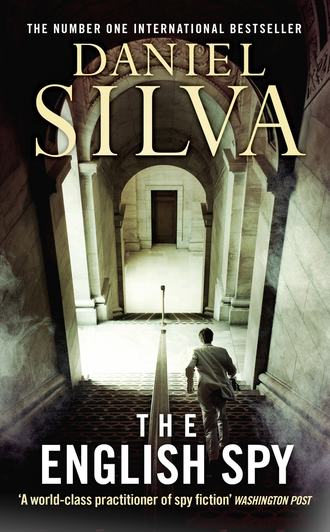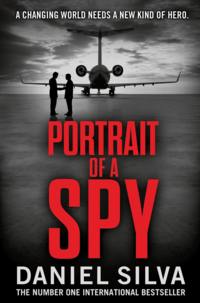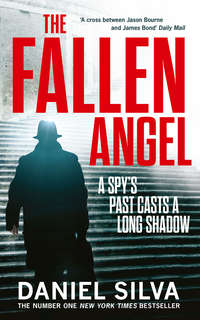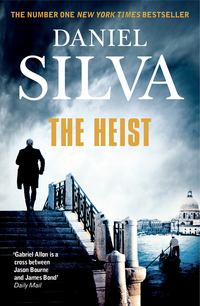
Полная версия
The English Spy
“Peel,” said Gabriel. “His name was Timothy Peel.”
“Ah, yes, young Master Peel. We could never figure out why you were spending so much time with him. And then we realized he was exactly the same age as the son you lost to the bomb in Vienna.”
“I thought we were talking about you, Graham.”
“We are,” replied Seymour.
He then reminded Gabriel, needlessly, that in the summer of 1998 he was the chief of counterterrorism at MI5. As such, he was responsible for protecting the British homeland from the terrorists of the Irish Republican Army. And yet even in Ulster, scene of a centuries-old conflict between Protestants and Catholics, there were signs of hope. The voters of Northern Ireland had ratified the Good Friday peace accords, and the Provisional IRA was adhering to the terms of the cease-fire. Only the Real IRA, a small band of hard-line dissidents, carried on the armed struggle. Its leader was Michael McKevitt, the former quartermaster general of the IRA. His common-law wife, Bernadette Sands-McKevitt, ran the political wing: the 32 County Sovereignty Movement. She was the sister of Bobby Sands, the Provisional IRA member who starved himself to death in the Maze prison in 1981.
“And then,” said Seymour, “there was Eamon Quinn. Quinn planned the operations. Quinn built the bombs. Unfortunately, he was good. Very good.”
A heavy thunderclap shook the building. Seymour gave an involuntary flinch before continuing.
“Quinn had a certain genius for building highly effective bombs and delivering them to their targets. But what he didn’t know,” Seymour added, “was that I had an agent watching over his shoulder.”
“How long was he there?”
“My agent was a woman,” answered Seymour. “And she was there from the beginning.”
Managing the agent and her intelligence, Seymour continued, proved to be a delicate balancing act. Because the agent was highly placed within the organization, she often had advance knowledge of attacks, including the target, the time, and the size of the bomb.
“What were we to do?” asked Seymour. “Disrupt the attacks and put the agent at risk? Or allow the attacks to go forward and try to make sure no one gets killed in the process?”
“The latter,” replied Gabriel.
“Spoken like a true spy.”
“We’re not policemen, Graham.”
“Thank God for that.”
For the most part, said Seymour, the strategy worked. Several large car bombs were defused, and several others exploded with minimal casualties, though one virtually leveled the High Street of Portadown, a loyalist stronghold, in February 1998. Then, six months later, MI5’s spy reported the group was plotting a major attack. Something big, she warned. Something that would blow the Good Friday peace process to bits.
“What were we supposed to do?” asked Seymour.
Outside, the sky exploded with lightning. Seymour emptied his glass and told Gabriel the rest of it.

On the evening of August 13, 1998, a maroon Vauxhall Cavalier, registration number 91 DL 2554, vanished from a housing estate in Carrickmacross, in the Republic of Ireland. It was driven to an isolated farm along the border and fitted with a set of false Northern Ireland plates. Then Quinn fitted it with the bomb: five hundred pounds of fertilizer, a machine-tooled booster rod filled with high explosive, a detonator, a power source hidden in a plastic food container, an arming switch in the glove box. On the morning of Sunday, August 15, he drove the car across the border to Omagh and parked it outside the S.D. Kells department store on Lower Market Street.
“Obviously,” said Seymour, “Quinn didn’t deliver the bomb alone. There was another man in the Vauxhall, two more in a scout car, and another man who drove the getaway car. They communicated by cellular phone. And we were listening to every word.”
“The Security Service?”
“No,” replied Seymour. “Our ability to monitor phone calls didn’t extend beyond the borders of the United Kingdom. The Omagh plot originated in the Irish Republic, so we had to rely on GCHQ to do the eavesdropping for us.”
The Government Communications Headquarters, or GCHQ, was Britain’s version of the NSA. At 2:20 p.m. it intercepted a call from a man who sounded like Eamon Quinn. He spoke six words: “The bricks are in the wall.” MI5 knew from past experience that the phrase meant the bomb was in place. Twelve minutes later Ulster Television received an anonymous telephone warning: “There’s a bomb, courthouse, Omagh, main street, five hundred pounds, explosion in thirty minutes.” The Royal Ulster Constabulary began evacuating the streets around Omagh’s courthouse and frantically looking for the bomb. What they didn’t realize was that they were looking in the wrong place.
“The telephone warning was incorrect,” said Gabriel.
Seymour nodded slowly. “The Vauxhall wasn’t anywhere near the courthouse. It was several hundred yards farther down Lower Market Street. When the RUC began the evacuation, they unwittingly drove people toward the bomb rather than away from it.” Seymour paused, then added, “But that’s exactly what Quinn wanted. He wanted people to die, so he deliberately parked the car in the wrong place. He double-crossed his own organization.”
At ten minutes past three the bomb detonated. Twenty-nine people were killed, another two hundred were wounded. It was the deadliest act of terrorism in the history of the conflict. So powerful was the revulsion that the Real IRA felt compelled to issue an apology. Somehow, the peace process held. After thirty years of blood and bombs, the people of Northern Ireland had finally had enough.
“And then the press and the families of the victims started to ask uncomfortable questions,” said Seymour. “How did the Real IRA manage to plant a bomb in the middle of Omagh without the knowledge of the police and the security services? And why were there no arrests?”
“What did you do?”
“We did what we always do. We closed ranks, burned our files, and waited for the storm to pass.”
Seymour rose, carried his glass into the kitchen, and removed the bottle of Gavi from the refrigerator. “Do you have anything stronger than this?”
“Like what?”
“Something distilled.”
“I’d rather drink acetone than distilled spirits.”
“Acetone with a twist might do the trick about now.” Seymour dumped an inch of wine into his glass and placed the bottle on the counter.
“What happened to Quinn after Omagh?”
“Quinn went into private practice. Quinn went international.”
“What kind of work did he do?”
“The usual,” replied Seymour. “Security work for the thugs and potentates, bomb-making clinics for the revolutionaries and the religiously deranged. We caught a glimpse of him every now and again, but for the most part he flew beneath our radar. Then the chief of Iranian intelligence invited him to Tehran, at which point King Saul Boulevard entered the picture.”
Seymour popped the latches on his briefcase, removed a single sheet of paper, and placed it on the coffee table. Gabriel looked at the document and frowned.
“Another violation of Office protocol.”
“What’s that?”
“Carrying a classified Office cable in an insecure briefcase.”
Gabriel picked up the document and began to read. It stated that Eamon Quinn, former member of the Real IRA, mastermind of the Omagh terrorist outrage, had been retained by Iranian intelligence to develop highly lethal roadside bombs to be used against British and American forces in Iraq. The same Eamon Quinn had performed a similar service for Hezbollah in Lebanon and Hamas in the Gaza Strip. In addition, he had traveled to Yemen, where he had helped al-Qaeda in the Arabian Peninsula construct a small liquid bomb that could be slipped onto an American jetliner. He was, the report said in its concluding paragraph, one of the most dangerous men in the world and needed to be eliminated immediately.
“You should have taken Uzi up on his offer.”
“Hindsight is twenty-twenty,” replied Seymour. “But I wouldn’t be so glib. After all, Uzi would have probably given the job to you.”
Gabriel methodically tore the document to tiny shreds.
“That’s not good enough,” said Seymour.
“I’ll burn it later.”
“Do me a favor, and burn Eamon Quinn while you’re at it.”
Gabriel was silent for a moment. “My days in the field are over,” he said finally. “I’m a deskman now, Graham, just like you. Besides, Northern Ireland was never my neck of the woods.”
“Then I suppose we’ll have to find you a partner. Someone who knows the turf. Someone who can pass for a local if need be. Someone who actually knows Eamon Quinn personally.” Seymour paused, then added, “Do you happen to know anyone who fits that description?”
“No,” said Gabriel pointedly.
“I do,” replied Seymour. “But there’s one small problem.”
“What’s that?”
Seymour smiled and said, “He’s dead.”
8
VIA GREGORIANA, ROME
OR IS HE?”
Seymour retrieved two photographs from his briefcase and placed one on the coffee table. It showed a man of medium height and build walking through passport control at Heathrow Airport.
“Recognize him?” asked Seymour.
Gabriel said nothing.
“It’s you, of course.” Seymour pointed to the time code at the bottom of the image. “It was taken last winter during the Madeline Hart affair. You slipped into the United Kingdom unannounced to do a little digging.”
“I was there, Graham. I remember it well.”
“Then you’ll also recall that you began your search for Madeline Hart on the island of Corsica, a logical starting place because that’s where she disappeared. Shortly after your arrival, you went to see a man named Anton Orsati. Don Orsati runs the island’s most powerful organized crime family, a family that specializes in murder for hire. He gave you a valuable piece of information regarding her kidnappers. He also allowed you to borrow his best assassin.” Seymour smiled. “Does any of this ring a bell?”
“Obviously, you were watching me.”
“From a discreet distance. After all, you were searching for the mistress of the British prime minister at my behest.”
“She wasn’t just his mistress, Graham. She was—”
“This Corsican assassin is an interesting fellow,” Seymour interrupted. “In truth, he’s not Corsican at all, though he certainly speaks like one. He’s an Englishman, a former member of the Special Air Service who walked off the battlefield in western Iraq in January 1991 after an incident involving friendly fire. The British military believes he’s dead. Sadly, so do his parents. But then, you already knew that.”
Seymour placed the second photograph on the coffee table. Like the first, it showed a man walking through Heathrow Airport. He was several inches taller than Gabriel, with short blond hair, skin the color of saddle leather, and square, powerful shoulders.
“It was taken on the same day as the first photo, a few minutes later. Your friend entered the country on a false French passport, one of several he has in his possession. On that particular day he was Adrien Leblanc. His real name is—”
“You’ve made your point, Graham.”
Seymour gathered up the photographs and offered them to Gabriel.
“What am I supposed to do with these?”
“Keep them as a memento of your friendship.”
Gabriel tore the photographs in half and placed them next to the shreds of the Office memo. “How long have you known?”
“British intelligence heard rumors for years about an Englishman working in Europe as a professional assassin. We were never able to learn his name. And never in our wildest dreams did we imagine he might be a paid asset of the Office.”
“He’s not a paid asset.”
“How would you describe him?”
“An old adversary who’s now a friend.”
“Adversary?”
“A consortium of Swiss bankers once hired him to kill me.”
“Consider yourself fortunate,” said Seymour. “Christopher Keller rarely fails to fulfill the terms of a contract. He’s very good at what he does.”
“He speaks highly of you, too, Graham.”
Seymour sat silently while a siren rose and faded in the street below. “Keller and I were close,” he said finally. “I fought the IRA from the comfort of my desk, and Keller was at the sharp end of my stick. He did the sort of things that were necessary to keep the British homeland safe. And in the end he paid a terrible price for it.”
“What’s his connection to Quinn?”
“I’ll let Keller tell you that part of the story. I’m not sure I can do it justice.”
A gust of wind hurled rain against the windows. The room lights flickered.
“I haven’t agreed to anything yet, Graham.”
“But you will. Otherwise,” Seymour added, “I’m going to drag your friend back to Britain in chains and hand him over to Her Majesty’s Government for prosecution.”
“On what charges?”
“He’s a deserter and a professional killer. I’m sure we’ll think of something.”
Gabriel only smiled. “A man in your position shouldn’t make idle threats.”
“I’m not.”
“Christopher Keller knows far too much about the private life of the British prime minister for HMG to ever put him on trial for desertion or anything else. Besides,” Gabriel added, “I suspect you have other plans for Keller.”
Seymour said nothing. Gabriel asked, “What else have you got in your briefcase?”
“A thick file on the life and times of Eamon Quinn.”
“What do you want us to do?”
“What we should have done years ago. Take him off the market as quickly as possible. And while you’re at it, find out who ordered and financed the operation to murder the princess.”
“Maybe Quinn’s returned to the fight.”
“The fight for a united Ireland?” Seymour shook his head. “That fight is over. If I had to guess, he killed her at the behest of one of his patrons. And we both know the cardinal rule when it comes to assassinations. It’s not important who fires the shot. It’s who pays for the bullet.”
Another gust of wind slammed against the windows. The lights dimmed and then died. The two spies sat in darkness for several minutes, neither man speaking.
“Who said that?” Gabriel asked finally.
“Said what?”
“That business about the bullet.”
“I believe it was Ambler.”
There was silence.
“I have other plans, Graham.”
“I know.”
“My wife is pregnant. Very pregnant.”
“So you’ll have to work quickly.”
“I suppose Uzi’s already approved it.”
“It was his idea.”
“Remind me to give Uzi a lousy assignment the moment after I’m sworn in as chief.”
A flash of lightning illuminated Seymour’s Cheshire cat grin. Then the darkness returned.
“I think I saw some candles in the kitchen when I was looking for a corkscrew.”
“I like the darkness,” said Gabriel. “It clarifies my thinking.”
“What are you thinking about?”
“I’m thinking about what I’m going to say to my wife.”
“Anything else?”
“Yes,” said Gabriel. “I’m wondering how Quinn knew the princess was going to be on that boat.”
9
BERLIN–CORSICA
THE SAVOY HOTEL STOOD AT the unfashionable end of one of Berlin’s most fashionable streets. A red carpet stretched from its entrance; red tables stood beneath red umbrellas along its facade. The previous afternoon Keller had spotted a famous actor drinking coffee there, but now, as he emerged from the hotel’s entrance, the tables were deserted. The clouds were low and leaden and a cold wind was plucking the last leaves from the trees lining the pavements. Berlin’s brief autumn was receding. Soon it would be winter again.
“Taxi, monsieur?”
“No, thank you.”
Keller slipped a five-euro note into the valet’s outstretched hand and set out along the street. He had registered at the hotel under a French alias—management was under the impression he was a freelance journalist who wrote about films—and stayed only a single night. He had spent the previous evening at a modest hotel called the Seifert, and before that he had passed a sleepless night in a grim little pension called the Bella Berlin. All three establishments had one thing in common: they were near the Kempinski Hotel, which was Keller’s destination. He was going there to meet a man, a Libyan, a former close associate of Gaddafi who had fled to France after the revolution with two suitcases filled with cash and jewels. The Libyan had invested $2 million with a pair of French businessmen after receiving assurances of a substantial profit. The French businessmen were already weary of their association with the Libyan. They were worried, too, about his past reputation for violence, for it was said of the Libyan that he used to enjoy pounding spikes through the eyes of the regime’s opponents. The French businessmen had turned to Don Anton Orsati for help, and the don had given the assignment to his most accomplished assassin. Keller had to admit he was looking forward to the fulfillment of the contract. He had never cared for the now-deceased Libyan dictator or the thugs who had kept his regime in power. Gaddafi had allowed terrorists of every stripe to train at his desert camps, including members of the Provisional Irish Republican Army. He had also supplied the IRA with arms and explosives. Indeed, nearly all the Semtex used in IRA bombs came directly from Libya.
Keller crossed the Kantstrasse and headed down the ramp of an underground parking garage. On the second level, in a part of the garage untouched by security cameras, was a black BMW that had been left for him by a member of the Orsati organization. In the trunk was a Heckler & Koch 9mm pistol with a suppressor; in the glove box was a cardkey that would open the door of any guest room at the Kempinski Hotel. The key had been acquired for the price of five thousand euros from a Gambian who worked in the hotel’s laundry department. The Gambian had assured the man from the Orsati organization that the cardkey would remain operational for another forty-eight hours. After that, the codes would undergo a routine change, and hotel security would issue new passkeys to all essential employees. Keller hoped the Gambian was telling the truth. Otherwise, there would soon be an opening in the Kempinski’s laundry department.
Keller slipped the gun and the cardkey into his briefcase. Then he placed his overnight bag in the trunk of the BMW and headed up the ramp to the street. The Kempinski was a hundred meters farther along the Fasanenstrasse, a big hotel with Vegas-bright lights over the entrance and a Parisian-style café overlooking the Kurfürstendamm. At one of the tables sat the Libyan. He was accompanied by a man of perhaps sixty and a once-beautiful woman with coal-black hair and Cleopatra makeup. The man looked like an old comrade from the court of Gaddafi; the woman looked well cared for and very bored. Keller assumed she belonged to the Libyan’s friend, for the Libyan liked his women blond, professional, and pricey.
Keller entered the hotel, aware of the fact that several surveillance cameras were now watching him. It didn’t matter; he was wearing a dark wig and heavy false spectacles. Five hotel guests, new arrivals, judging by the look of them, were waiting for an elevator. Keller allowed them to board the first available carriage and then rode to the fifth floor alone, his head lowered in such a way that the surveillance camera could not clearly capture the features of his face. When the doors opened, he stepped out of the carriage with the air of a man who was not looking forward to returning to the loneliness of yet another hotel room. A single member of the housekeeping staff gave him a drowsy nod, but otherwise the corridor was empty. The cardkey was now in the breast pocket of his overcoat. He removed it as he approached Room 518 and inserted it into the slot. The green light shone, the electronic lock disengaged. The Gambian would live another day.
The room had been recently serviced. Even so, the stench of the Libyan’s appalling cologne persisted. Keller moved to the window and looked into the street. The Libyan and his two companions were still at their table at the café, though the woman appeared restless. In the time since Keller had seen them last, their plates had been cleared and coffee had been served. Ten minutes, he reckoned. Maybe less.
He turned from the window and calmly surveyed the room. The Kempinski thought it superior, but it was really quite ordinary: a double bed, a writing desk, a television console, a royal-blue armchair. The walls were thick enough to smother all sound from the adjoining rooms, though not thick enough to withstand a normal bullet, even a bullet that had penetrated a human body. As a result, Keller’s HK was loaded with 124-grain hollow-point rounds that would expand on impact. Any round that struck the intended target would remain there. And in the unlikely event Keller somehow missed, the round would lodge harmlessly in the wall with a dull thud.
He returned to the window and saw that the Libyan and his two companions were on their feet. The man of perhaps sixty was shaking the Libyan’s hand; the once-beautiful woman with coal-black hair was gazing longingly at the parade of exclusive shops lining the Ku-Damm. Keller drew the heavy curtains, sat down in the royal-blue armchair, and removed the HK from his briefcase. From the corridor came the squeak of a housekeeper’s trolley. Then all was silent. He glanced at his wristwatch and marked the time. Five minutes, he thought. Maybe less.

A benevolent sun shone brightly upon the island of Corsica as the overnight ferry from Marseilles eased into the port of Ajaccio. Keller filed off the vessel with the other passengers and made his way to the car park, where he had left his battered old Renault station wagon. A powdery dust covered the windows and the hood. Keller thought the dust a bad omen. In all likelihood the sirocco had carried it from North Africa. Instinctively, he touched the small red coral hand hanging around his neck by a strand of leather. The Corsicans believed the talisman had the power to ward off the occhju, the evil eye. Keller believed it, too, though the presence of North African dust on his car the morning after he had killed a Libyan suggested the talisman had failed to protect him. There was an old woman in his village, a signadora, who had the power to draw the evil from his body. Keller was not looking forward to seeing her, for the old woman also had the power to glimpse both the past and the future. She was one of the few people on the island who knew the truth about him. She knew his long litany of sins and misdeeds, and even claimed to know the time and circumstances of his death. It was the one thing she refused to tell him. “It is not my place,” she would whisper to him in her candlelit parlor. “Besides, to know how life ends would only ruin the story.”
Keller climbed behind the wheel of the Renault and set out down the island’s rugged western coastline, the turquoise-blue sea to his right, the high peaks of the interior to his left. To pass the time he listened to the news on the radio. There was nothing about a dead Libyan at a luxury hotel in Berlin. Keller doubted the body had even been discovered yet. He had committed the act in silence and upon leaving the room had hung the Do Not Disturb sign on the latch. Eventually, the Kempinski’s management would take it upon themselves to knock on the door. And upon receiving no response, management would enter the room and find a valued guest with two bullet holes over his heart and a third in the center of his forehead. Management would immediately telephone the police, of course, and a hasty search would commence for the dark-haired, mustachioed man seen entering the room. They would manage to track his movements immediately after the killing, but the trail would go cold in the wooded gloom of the Tiergarten. The police would never establish his identity. Some would suspect him of being a Libyan like his victim, but a few of the wiser veterans would speculate that he was the same high-priced professional who had been killing in Europe for years. And then they would wash their hands of it, for they knew that murders carried out by professional assassins were rarely solved.







